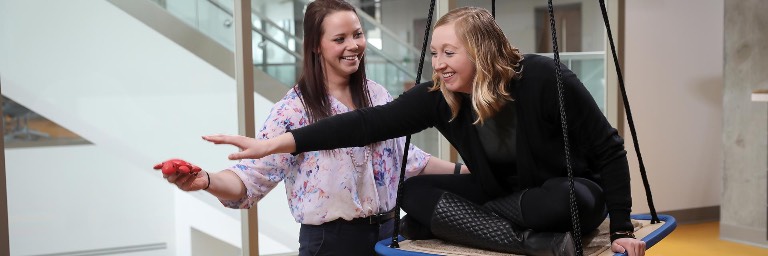Rehabilitation & Human Services Minor
Learn to make a lasting difference in the lives of people with disabilities.
Help people by improving their quality of life and life experiences with a minor in Rehabilitation & Human Services.
- Program type:
- Minor
- Format:
- On Campus or Online
- Est. time to complete:
- 1-2 years
- Credit hours:
- 20
Why minor in Rehabilitation & Human Services?
Rehabilitation and human services is an interdisciplinary program that draws from psychology, sociology, social work, nursing and other fields. Take core courses in rehabilitation, research methodology and psychology.
- The program is one of more than 25 undergraduate rehabilitation programs recognized by the Committee on Rehabilitation Accreditation (CoRA) under the auspices of the Commission on Accreditation of Allied Health Education Programs (CAAHEP). CAAHEP promotes and advances the quality of educational programs for inclusive rehabilitation sciences.
- You'll complete an internship in a professional rehabilitation agency that will enable you to apply theory to practice and integrate knowledge, values and skills.
- Graduates of the addictions program are well positioned to obtain licensure in North Dakota and other states in substance abuse counseling.
What majors pair well with a Rehabilitation & Human Services minor?
Combining a Rehabilitation & Human Services minor with certain majors can enhance your understanding of human behavior, social services, and rehabilitation practices, broadening your career opportunities in fields focused on helping others. You can also further your education in this area with a bachelor's degree in Inclusive Rehabilitation Science. Here are some bachelor's degrees that complement a Rehabilitation & Human Services minor:
- Psychology Degree: A Psychology major provides valuable insights into human behavior, mental health, and therapeutic techniques, which are essential for understanding and supporting individuals in rehabilitation settings.
- Social Work Degree: Social Work majors learn about social justice, advocacy, and intervention strategies to address various social and emotional challenges faced by individuals and communities, aligning closely with the goals of rehabilitation and human services.
- Sociology Degree: Sociology majors study social structures, relationships, and inequalities, providing a broader understanding of the societal factors influencing rehabilitation outcomes and the delivery of human services.
- Public Health Education Degree: Public Health Education majors focus on promoting health and wellness through community-based programs and education initiatives, complementing the holistic approach of rehabilitation and human services to improve overall well-being.
- Education Degrees: Education majors, particularly those specializing in special education or counseling, can provide valuable skills in instructional techniques, behavior management, and individualized support for individuals with disabilities or special needs, enhancing the effectiveness of rehabilitation and human services programs.
